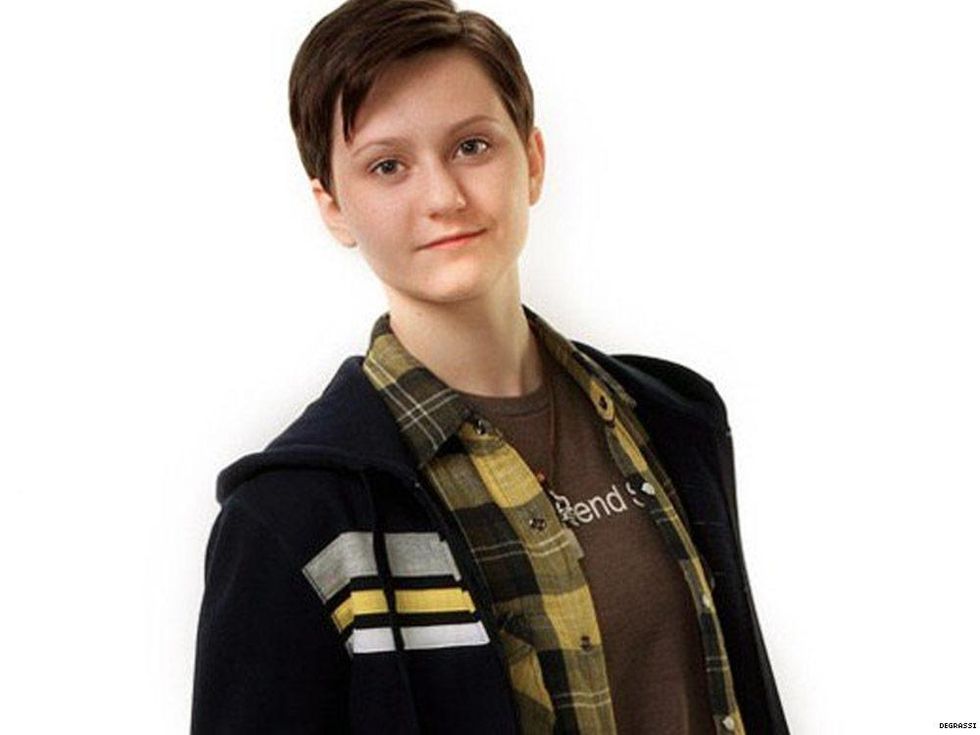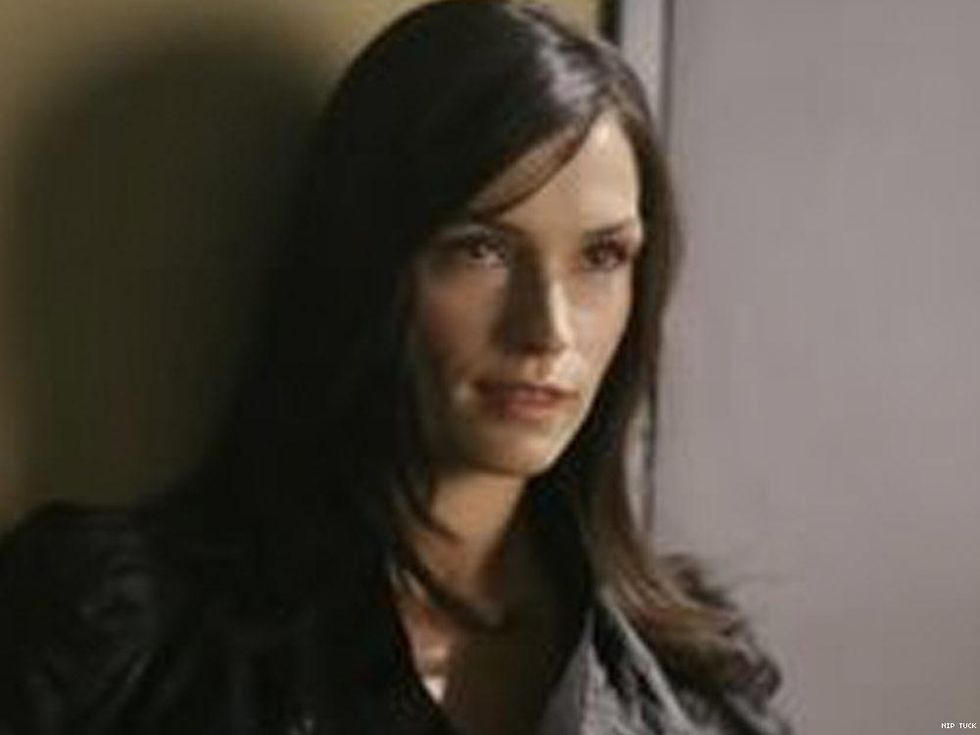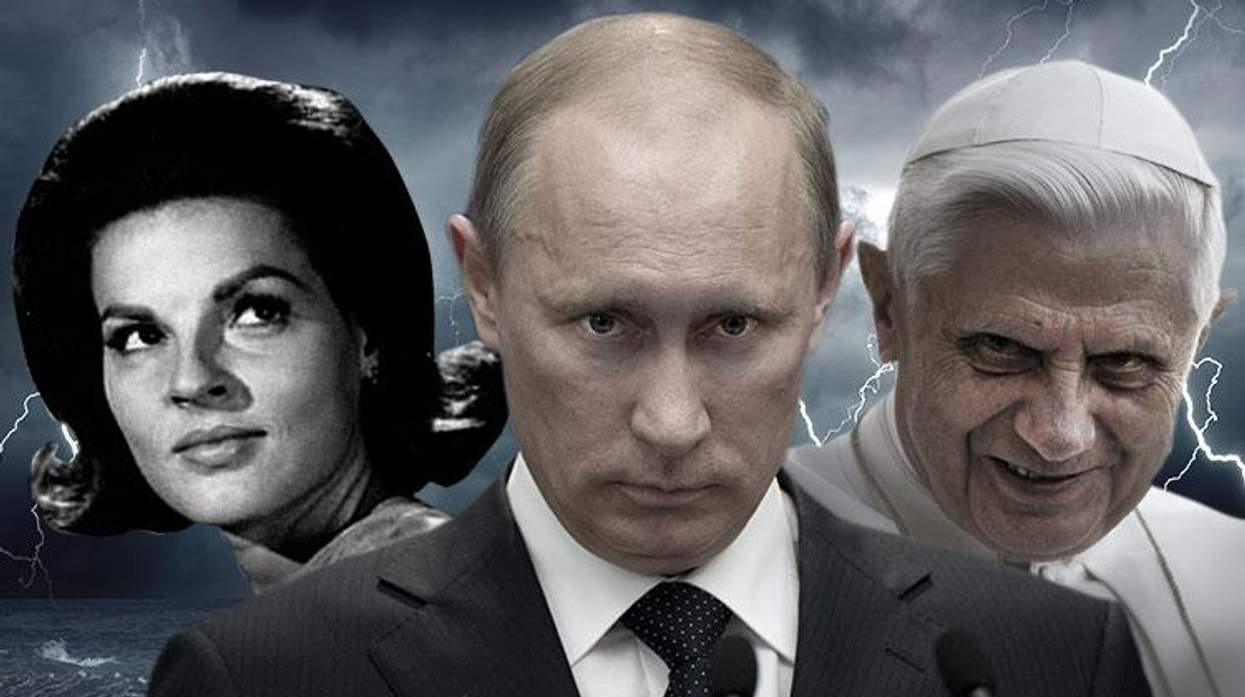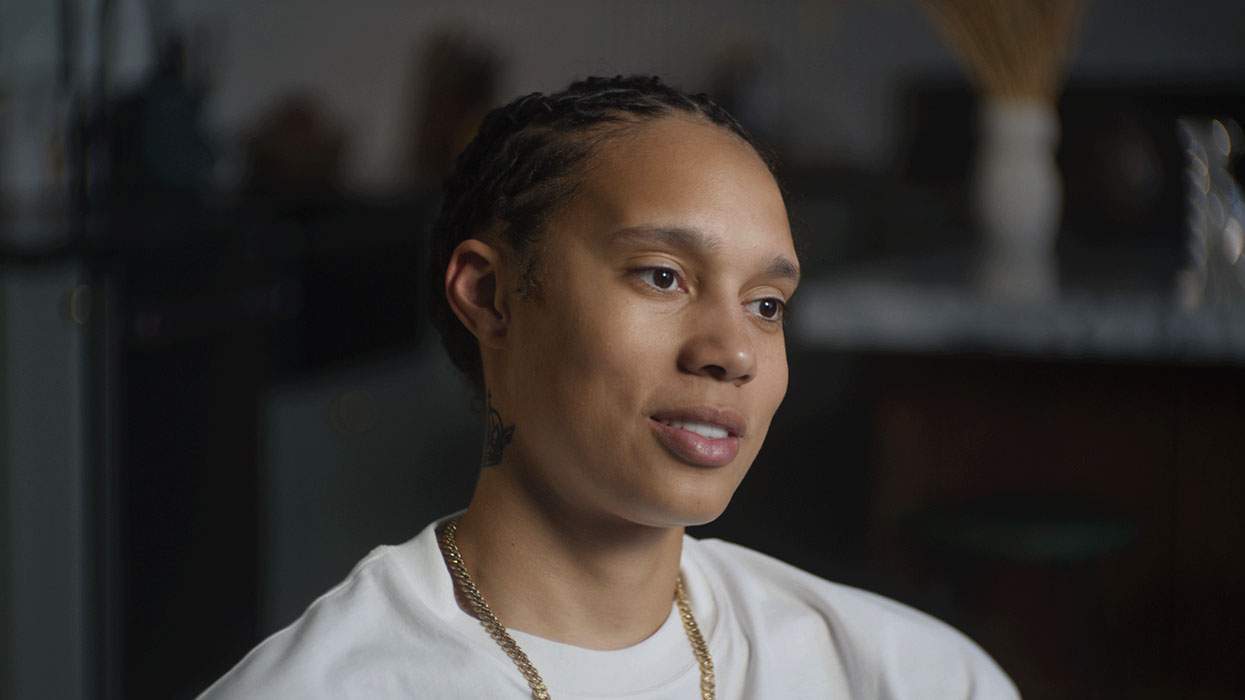Television Has a Long History of Casting Cis People as Trans

There was outcry last week when it was announced that Scarlett Johansson was cast as trans man Dante "Tex" Gill in the upcoming film Rub & Tug from Rupert Sanders, the same director who cast her as Asian in the controversial Ghost in the Shell.
What made things worse was Johansson's callous, cavalier response to the trans community's protestations about another cis person being cast in a role that should have gone to a trans person. Responding to criticism, Johansson said through a representative, "Tell them that they can be directed to Jeffrey Tambor, Jared Leto, and Felicity Huffman's reps for comment."
[RELATED: 23 Cisgender Actors Who Played Transgender in Movies]
The Avengers star was, of course, referring to cis actors who'd earned high praise and/or awards for taking on roles that were not afforded to trans people.
In recent years television has done a better job than film when it comes to casting trans people to tell trans stories, with Laverne Cox on Orange Is the New Black, Elliot Fletcher in Faking It, The Fosters, and Shameless, Alexandra Billings and Trace Lysette in Transparent, Jamie Clayton in Sense8, and the ensemble of trans actresses in Pose.
For decades, cis people have been cast in trans roles that range from the sympathetic to wildly offensive. We look at the history of casting cis people as trans on television below.
Jeffrey Tambor in 'Transparent'

Amazon's Transparent follows Maura Pfefferman (Jeffrey Tambor), who comes out to her family as a transgender woman. Though showrunner Jill Soloway cast a cis actor to portray the transgender lead, they cast transgender actors to play the show's other trans characters and hired over 80 transgender people as actors, producers, or consultants. Tambor, who won an Emmy for the role, exited the show after trans costar Trace Lysette and Tambor's former assistant, Van Barnes, who is also trans, accused the actor of sexual harassment. The acclaimed series will continue for at least one more season without him, choosing most likely to focus on Maura's dysfunctional family members.
Vanessa Ray in 'Pretty Little Liars'

When it was revealed that Pretty Little Liars' omnicient cyberbully "A" was actually CeCe Drake (Vanessa Ray) and that she was transgender, fans were fairly outraged. CeCe, the long-lost sister of the show's once-missing teen Alison (Sasha Pieterse), taunts the main characters through ominous text messages, and, at-turns, imprisons and tortures them. The show began airing in 2010 and often paid homage to Alfred Hitchcock's work, but it went awry with its biggest reveal. The CeCe plot tapped into the old horror trope of killer characters with gender dysphoria that dates back to Psycho and runs through Dressed to Kill and The Silence of the Lambs. CeCe's portrayal was much more sympathetic than the aforementioned characters, but she fed into a nasty, dangerous stereotype.
Tatiana Maslany in 'Orphan Black'

Over the course of five seasons, Emmy-winner Tatiana Maslany portrayed more than a dozen clones on the BBC America sci-fi series Orphan Black, one of whom is a transgender man. While Maslany's performance in the series was an unarguable tour de force, her portrayal of clone Tony Sawicki in the second season drew some criticism from fans. Cisgender writer Tariq Kyle, who otherwise condoned Maslany's casting as Tony, wrote in Hypable that the depiction of Tony seemed to be based on stereotypes of transgender people.
"If they want to be truly inclusive they need to do their research, and they need to realize that simply putting Maslany in men's clothes and slapping on a goatee doesn't equal fair representation," he wrote.
Jonny Beauchamp in 'Penny Dreadful'

Jonny Beauchamp's Angelique in Showtime's Penny Dreadful is a Victorian-era sex worker in a world filled with vampires, werewolves, and seekers of immortality. To the show's credit, Angelique is portrayed as a kind soul in search of companionship, and the story even grants her a coming-out party of sorts, but the series kills her off when she discovers Dorian Gray's (Reeve Carney) secret.
Alex Newell in 'Glee'

Out gay actor Alex Newell portrayed transgender character Wade "Unique" Adams on Glee from the third to fifth season. Speaking to Pride Source, Newell admitted that he does not see himself as trans, although Glee's viewers sometimes assumed he was transitioning alongside his character.
"I was at some AIDS benefit and I was walking the carpet and this one man literally looked at me and said, 'So, your character is great, but how far along are you in your transition?' I was just like, 'Excuse me? No, no, no, no. My character is transitioning. I'm not. I'm just a little black gay boy from Massachusetts.' But that means I'm probably just doing my job that much better."
Dot Jones in 'Glee'

Out actress Dot Jones portrayed Glee's big-hearted Coach Beiste for several seasons before the character came out as a trans man in the show's final season. In an interview with The Advocate, Jones said that though she is a cis woman, she has had experience with being misgendered.
"My biggest thing is just being respectful," Jones told us. "The last thing I want to do is disrespect anybody in what I'm portraying, and to do it respectfully and with class, and with dignity and pride, and I could not have been prouder than I was that day [that we filmed those scenes]."
Chloe Sevigny in 'Hit & Miss'

British drama Hit & Miss cast cis actress and LGBT icon Chloe Sevigny as a transgender assassin who discovers she had a child with her late ex-girlfriend. The show's creators considered some transgender actresses for the role before ultimately casting Sevigny.
But the show's tagline, "She's not your typical dad," put some viewers on alert about how the show was exploiting the trans storyline.
Even Sevigny considered the repercussions of taking on the role. "I was wondering why they didn't want to cast a man or a real transgender person, and I guess they'd met with a lot of people and it didn't work out," Sevigny told The Guardian. "And I was afraid of the pressure from the gay community or the transgender community and how they would feel, and wanting to be respectful."
Jordan Todosey in 'Degrassi'

Cis actress Jordan Todosey played transgender character Adam Torres in the long-running series Degrassi. GLAAD said that Todosey's character, who first came on-screen in 2010, "was the first transgender teen character to appear as a series regular on a scripted TV show."
Most of the criticism surrounding Todosey's character was Degrassi's decision to kill him off in the show's seventh season. GLAAD, which had provided consultation for the episodes depicting Torres's coming-out and helped make the public service announcements that followed the Degrassi episodes, expressed disappointment with the character being unceremoniously killed off.
"When Degrassi introduced its large and loyal audience to Adam Torres, an authentic, multi-dimensional transgender character, the show not only made television history, but set a new industry standard for LGBT inclusion," said GLAAD's Wilson Cruz. "With so few transgender characters on television, we are disappointed that Adam's story had to end this way, and we hope other shows will follow Degrassi's lead in bringing stories like his to viewers."
Daniela Sea in 'The L Word'

The L Word introduced trans character Max (Daniela Sea) in its second season in 2005. The much-maligned character Jenny (Mia Kirshner) had gone back home to her small town following a suicide attempt only to return to Los Angeles with Max (then Moira) in tow. Over the course of the season, Max comes to terms with his gender and comes out as trans. The show chronicles the struggles associated with his transition, including being fired from a job after coming out and being shunned by some family members at his mother's funeral.
The show has been criticized for its inaccurate portrayal of transition and a stereotypical portrayal of a trans person as explosive and a cheater. The show has also been criticized for first portraying Max as a butch lesbian before transitioning and failing to differentiate between sexual orientation and gender identity.
Rebecca Romijn in 'Ugly Betty'

Presumed to be dead at the beginning of the hit series Ugly Betty, the editor in chief of the show's Hudson magazine, Alexis Meade (Rebecca Romijn), resurfaced with the big reveal that she was trans during the show's first season. Alexis's struggles on the series included her strained relationship with her transphobic father and rivalry with her jealous brother.
"The only thing that made me nervous was that I have a couple friends who are transgender, and it's a really sensitive subject for them, obviously, so every choice that I make, I think about them," Romijn told Marie Claire about taking on the role. "I would never, ever, ever want to insult or offend. The role is going to open itself up to people's jokes -- I mean, that's just the way it is. But I want to make everybody aware that I am not the unofficial spokesperson for the transgender community."
Famke Janssen in 'Nip/Tuck'

Janssen joined the Ryan Murphy plastic surgery drama as Ava Moore, who earlier identified as a gay man who worked as an escort for wealthy elderly ladies. In this twisted tale of gender reassignment, Ava was in love with Dr. Barrett Moore (Alec Baldwin), who was straight and did not reciprocate his feelings. Desperate to win the doctor over, Ava asked the doctor to perform gender-confirmation surgery on her. The two married and struggled with the doctor never fully accepting Ava as a woman, seeing her rather as a prized creation, a familiar trope in trans narratives.
David Duchovny in 'Twin Peaks'

David Duchovny originally played Denise Bryston, a transgender DEA agent, in three episodes of the 1990s version of Twin Peaks. But Special Agent Bryson returned for last year's Twin Peaks reboot at a time when a once-groundbreaking character is now interpreted as problematic. In the reboot, Denise has been promoted to FBI chief of staff, offering a rare depiction of a transgender character in power, but with the overwhelming issue of a cis actor playing trans.










